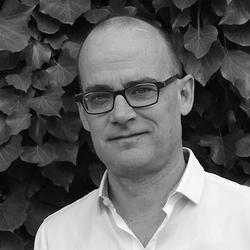Peter Yeadon

Peter Yeadon is a professor of Industrial Design at RISD, where he and his students have been exploring materials-driven innovation since 2002. Their work engages in advanced materials research and direct, hands-on learning experiences as they conceive of future applications for emergent materials. Peter’s RISD Biodesign students design and prototype applications for a broad range of biomaterials that they have studied and worked with. Similarly, his RISD Catalyst students focus on creating solutions-oriented applications for smart materials, nanomaterials, and other programmable substances.
In addition to teaching, Peter has been appointed to many committee and leadership roles at RISD. He recently served as head of the department of Industrial Design (2018–20, 2022), and as ID department coordinator (2020–22). He has served as coordinator of the RISD HEALTH+ Faculty Research Cluster (2015–16, 2018). Peter led the RISD in Seoul program in 2017. He served on the Academic Affairs Committee of the Board of Trustees (2013–16), the Research Advisory Council (2013–16), the Nike Partnered Research Program (2015), and the RISD Instruction Committee (2003–13) and was chair of the RISD Curriculum Committee (2007–12). Peter was a faculty advisor for the European Solar Decathlon Project (2012–14). He has been an active member of RISD RISE (RISD Initiative on Sustainability and the Environment) since 2012. Prior to RISD, Peter was a faculty member at Cornell University and the University of Toronto.
As head of the Industrial Design department, Peter was involved in and/or led a number of successful initiatives at RISD, including: creating a new RISD-Brown Master of Arts in Design Engineering (MADE) degree program with Brown University’s Department of Engineering; achieving STEM designation for all RISD Industrial Design degree programs; opening a new ID gallery for students and faculty; procuring enhanced access to the Health Design Fund for students and the Marc Harrison Fund for faculty; establishing an ID SEI Faculty Committee on social equity and inclusion; launching an internal ID intranet to aid and support faculty members; enabling IDSA Make-A-Thon events; running IRB workshops for faculty; expanding ID’s capabilities with new fabrication equipment and technologies; and leading the department in spring 2020 when campus was vacated and RISD turned to remote learning at the first outbreak of COVID-19.
Peter also maintains an active professional practice in New York City. He is a registered architect in the state of New York and founder of Yeadon Space Agency, an architecture and design consultancy in NYC that focuses on projects that incorporate substances with novel properties, including various smart materials, nanomaterials, and biomaterials that respond to changes in their environment. He has been a guest speaker at dozens of universities, organizations, and conferences. His work has appeared in a broad range of publications and exhibitions across the globe, from the China Science & Technology Museum and the Bauhaus Archiv Museum für Gestaltung to the Journal of Intelligent Material Systems and Structures and GQ Italia. In New York City, Peter has served as an advisor to the Biodesign Challenge organization since 2015 and has been on the Advisory Council of the Climate Museum since 2015. He has been a competition judge and guest speaker at both the Biodesign Challenge Summit and Biodesign Challenge Sprint, and he has served as a competition judge at the iGEM (International Genetically Engineered Machines) Competition. He is currently a Year 10 mentor for the NEW INC (New Museum of Contemporary Art) 2023 Fellows in NYC.